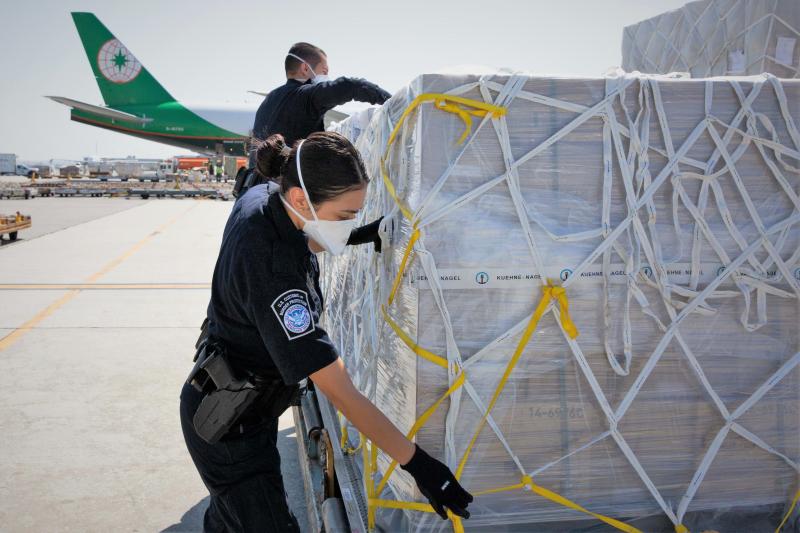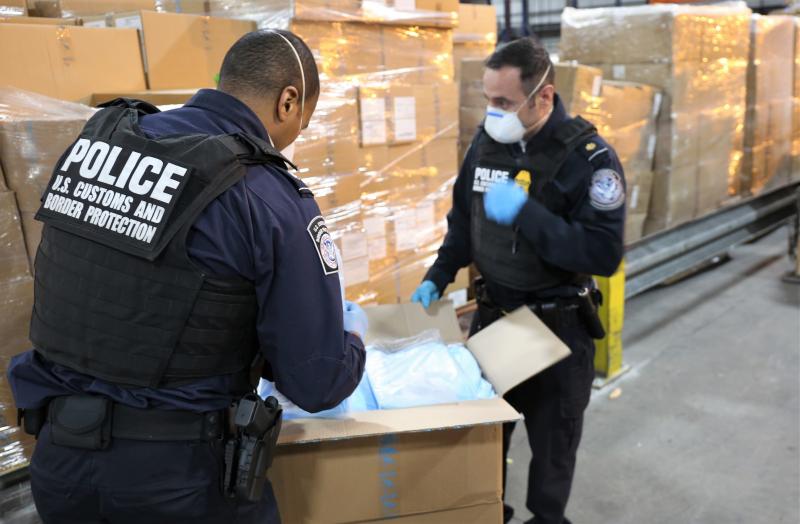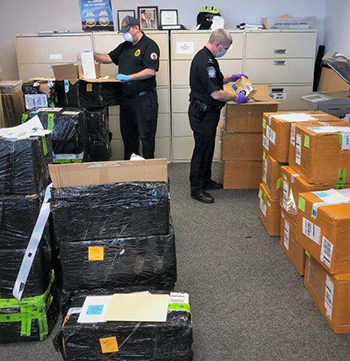
Keeping Trade Flowing

CBP’s COVID-19 Cargo Resolution Team, comprised of a network of subject matter experts from across CBP, works with FEMA on a daily basis to alert ports that shipments of critical medical supplies are arriving. Above, a CBP officer at O’Hare International Airport in Chicago watches as personal protective equipment is unloaded from a FEMA-chartered flight from China. Photo by Alexis Hall
In early March, when America was starting to grapple with the spread of the coronavirus, many feared the pandemic would have devastating effects on trade. A series of presidential proclamations restricted travel from China, Europe, Iran, and then later from the United Kingdom, Ireland, Canada, Mexico, and Brazil but no restrictions were placed on legitimate trade. “The ports are open. We continue to process the trade that arrives and clear cargo. Any perception that our borders are closed is false. We are not shut down,” said Thomas Overacker, U.S. Customs and Border Protection’s executive director of cargo, conveyance, and security. “Trade is flowing the same as usual.”
That is, with the exception of personal protective equipment such as masks, gloves, surgical gowns, disinfectants, and medical devices including ventilators. As the virus swept across the country, the demand for health and safety goods catapulted and massive amounts of these imported products poured in through the ports.
“In the first three months of 2020, the U.S. imported twice as much personal protective equipment and medical supplies as we imported during the entire preceding year,” said Lea-Ann Bigelow, CBP’s director of interagency collaboration trade policy and programs. “The sudden surge in volume of these imports is unprecedented.”
Clearing these goods is no easy feat. “Personal protective equipment and medical supplies are not simple commodities. They’re highly regulated, so partner government agencies’ information and data requirements need to be met by importers, and those are very detailed,” said Bigelow. “There are very high safety standards that need to be met in order for these imports to enter the stream of commerce. So it takes an enormous amount of coordination at the border across major federal agencies.”

face masks that arrived on a flight at New York’s JFK International
Airport in early April. Photo by Biju Mathew
At first, the challenge was compounded by a lack of interagency guidance. “We were put in the difficult situation of working with our partners at all hours to clear these critical shipments. It wasn’t something that could be cleared at the staff level. We needed to coordinate across agencies at the senior level to make decisions on individual shipments because policy and guidance were not yet in place for these nontraditional emergency shipments, and there really was no time to spare,” explained Bigelow.
For example, on March 12, a shipment of 75,000 coronavirus test kits from Rome, Italy, was detained by CBP’s agriculture specialists at Boston Logan International Airport because a veterinary certificate did not meet the U.S. Department of Agriculture’s, USDA, permit requirements. The importer, a medical supply company, contacted the Food and Drug Administration, FDA, to find out why the shipment was being held. A senior official at FDA contacted Bigelow to see what she could do. “Under ordinary circumstances, this could have been resolved at the staff level by requesting additional information from the shipper,” said Bigelow. “But because this shipment was coming from Italy, when the country was being hit hard by the pandemic, we made a decision in the U.S. government that we were going to elevate this to the highest levels of USDA’s veterinary office to obtain clearance based on other elements of the shipment that made it lower risk. The importer was a trusted partner that frequently imported products into the U.S.”
Keeping trade flowing during the COVID-19 pandemic has presented a myriad of challenges, but CBP has remained fully operational by working closely with its government partners and industry. “It’s through the partnerships and relationships that we have built over time that we’re able to operate under these conditions and keep the supply chain moving. We don’t do this alone,” said Overacker.
At John F. Kennedy International Airport in New York, CBP’s Anti-Terrorism Contraband Enforcement Team boards a flight to inspect personal protective equipment donated from overseas. Photo by Biju Mathew
Team of experts
As the demand for personal protective equipment and medical supplies grew urgent, ports around the country were flooded with questions and requests to help facilitate the shipments. “We needed one place to give uniform answers and the correct guidance,” said JoAnne Colonnello, the director of CBP’s Center of Excellence and Expertise for Pharmaceuticals, Health, and Chemicals. The agency also needed a touchpoint to internally coordinate with other government agencies, advise the public, and track high level shipments that were coming in to state and local governments. The COVID-19 Cargo Resolution Team, comprised of a network of subject matter experts from across CBP, was formed. The specialized team, which is part of CBP’s Pharmaceuticals, Health, and Chemicals Center, has varied expertise related to cargo.
Immediately after the team was established in late March, it began tracking critical medical supply shipments that the Federal Emergency Management Agency, FEMA, was airlifting to expedite delivery from overseas. Known as “Project Airbridge,” the initiative was designed to reduce the time it takes for U.S. medical supply distributors to receive these essential items for their customers. “A lot of companies were already bringing these supplies in, but the general mode of transportation was sea cargo, which takes several weeks. FEMA is paying to fly these goods to the U.S. so they are here within hours,” said Colonnello. “We work with FEMA on a daily basis to alert the ports that these shipments are coming in. If there are any kinds of issues, we try to intervene to get those shipments delivered as quickly as possible.”
Case in point was a FEMA-chartered flight that arrived on a Sunday in late April at Chicago O’Hare International Airport. A shipment of surgical face masks that had been detained by CBP was among the cargo on the flight. The importer’s trucks were already standing by waiting at the airport. “The broker contacted us Sunday at 4pm and the shipment was released by 8pm,” said Colonnello. “A member of our team contacted the port and was able to resolve the issue. She knew exactly who to call and helped facilitate the release of the shipment that night.”

CBP Officers Anastasios Metallinos, rear, and Sabrina Modesto check a shipment of personal protective equipment on the tarmac at Los Angeles International Airport in late April. The cargo arrived on a FEMA-chartered Project Airbridge flight that was flown to the West Coast. Photo by Vincent Vuong
During its first month of operation, the COVID-19 Cargo Resolution Team expedited the arrival and clearance of approximately 100 Project Airbridge flights, containing nearly one billion articles of personal protective equipment.
The specialized team provides guidance to the importing community and to state and local governments on areas such as what’s dutiable, the entry process, and how to clear goods. The team also explains importing requirements for donations. “A lot of corporations, manufacturers, private individuals, and even foreign governments are donating supplies to state and local institutions,” said Colonnello. “As is the case with any foreign shipment, donations are subject to the regulations of CBP, FDA, USDA, and other federal agencies.”
The majority of inquiries are from first time importers. “Most of the questions we receive are not from experienced importers. They are from people who have never imported before, but want to be compliant,” said Colonnello. “A lot of times it’s people who say they know somebody who knows somebody who can get them masks from China. In one instance, we even received a call from a group of 20 neighbors who pooled their money together to buy surgical masks for their community, but had no idea how to import. What we try to do with first time importers is guide them through the process and let them know what each of the agencies regulates and what the requirements are.”
By the end of April, the COVID-19 Cargo Resolution Team had received and responded to over 1,700 inquiries for information or assistance. In its first month, the team facilitated 579 shipments. “At first, we were scrambling to stay on top of the inquiries. We were receiving 40 to 50 a day,” said Colonnello, “but now we’ve got a good battle rhythm.”
Working with partners
Most of the shipments are facilitated with help from government partners. In one instance, the state of Colorado had purchased $1.8 million of COVID-19 test kits from a laboratory in South Korea. The Colorado governor’s office contacted the FDA to find out how the state could help in getting the shipment of test kits faster. “We didn’t have any information regarding the shipment,” said Dan Solis, FDA’s acting assistant commissioner for the Office of Enforcement and Import Operations. “The only information the governor’s office knew was the shipment’s tracking number, and we discovered that the test kits were still in South Korea. The shipment wasn’t due to arrive in the U.S. for several days.”
Solis suggested that the governor’s office reach out to CBP. “As soon as CBP’s Intergovernmental Public Liaison Office was contacted, they researched the entry number, when the shipment was arriving, and all of the logistical information was exchanged between CBP and FDA,” said Solis. On April 21, the test kits were cleared in Anchorage, Alaska, and flown to Colorado. “The shipment arrived 48 hours after the governor’s office asked for help. In today’s environment, for us to clear a shipment like that, it’s quick,” said Solis, who added that while this example stands out because of its high-level nature, even before the pandemic, CBP and FDA worked very closely. “We coordinate shipments with CBP daily. We communicate daily. It was because the foundation of our relationship was already built that we were able to expedite this shipment.”

Two CBP officers at JFK International Airport in New York examine personal protective equipment from an overseas flight. During the early months of 2020, an unprecedented amount of personal protective equipment and medical supplies were imported into the U.S. Photo by Biju Mathew
Longstanding ties with industry also are keeping the supply chain moving. In mid-April, Abbott Laboratories, an American, multinational medical device and health care company based in the northern suburbs of Chicago, sent a hand-carried shipment of research and development materials from Frankfort, Germany to its headquarters to use in a new COVID-19 test under development. “We didn’t want to risk sending the shipment by express courier or any other method. We paid a courier to get on an airplane and hand carry these products so that we could keep an eye on them,” said Susie Hoeger, Abbott’s senior director of global trade compliance and policy.
The materials, which were arriving on a Friday afternoon at O’Hare Airport, were temperature sensitive and urgently needed to complete the testing of the new COVID-19 product, so the speed of delivery to Abbott’s test lab was critical. “We were concerned because the products are regulated by CBP as well as subject to USDA and FDA requirements, and that can be a pretty complex process,” said Hoeger. “We wanted to make sure that there would be people there to clear the shipment and that it wouldn’t be stuck at the airport over the weekend.”
Hoeger reached out to CBP ahead of time to make sure the agency knew the shipment was coming. “We’ve always had a really strong relationship with CBP, so when we have a shipment coming in that requires facilitation, I reach out to our account manager at the pharmaceutical Center and let him know it’s coming. In this case, he gave a heads-up to the port,” said Hoeger.
All went smoothly. Within two hours of the plane’s landing, the materials arrived at Abbott’s test lab. “Getting something cleared by three different agencies and delivered into our testing lab within two hours of the plane’s landing was definitely a success from our standpoint,” said Hoeger.
According to Hoeger, the relationship between CBP and industry has remained strong during the pandemic. “The role of health care companies in fighting the pandemic is clearly at the forefront, whether that be through COVID-19 testing or the development of treatments and vaccines. But along with our industry, CBP’s pharma and health Center of Excellence and Expertise is also at the forefront,” said Hoeger. “When the pandemic hit, we saw the Center take a very proactive role in reaching out and asking what they could do to facilitate shipments,” she said. “The Center also has helped prevent counterfeit health care products from coming into the country. They’ve asked us for information about our products—copies of our labels, copies of our packaging—so that they can help identify any potential counterfeits. The Center has been by our side in terms of what they can do to help.”
Enforcement efforts

to partner with other federal agencies to perform its
enforcement mission. Here, Chief CBP Officer
Brendan Stack, right, and FDA Consumer Safety Officer
Weston Szymanski conduct a joint inspection of N95 masks
imported from China at the port of Boston. Ultimately, the
agencies determined that the masks were counterfeit.
Photo by Brett Sweet
CBP has continued to partner with others to perform its enforcement mission too. For example, in mid-March, CBP officers at a DHL facility in Boston referred three shipments of N95 masks from China to the FDA for a regulatory review. As routine surveillance, the CBP officers did a side-by-side joint exam with FDA consumer safety officers. The masks looked suspicious and were detained.
Together, the officers compared the masks with the model and type of N95 mask on the manufacturer’s website and with photos in the FDA’s database. They also sent sample masks to the National Institute for Occupational Safety and Health, NIOSH, to be analyzed. N95 masks, which filter at least 95 percent of airborne particles including droplets containing coronavirus, are evaluated, tested, and approved by NIOSH.
“NIOSH determined that the masks were counterfeit and unsafe for medical practitioners to use,” said Solis from the FDA. “If we had allowed these masks to enter the commerce and into a hospital, they could have contributed to the COVID-19 infections and would have caused more harm than good. Because CBP and FDA are working so closely together, we’re able to protect the American public from having these substandard goods come into the country.”
Since early March, the two agencies have jointly interdicted more than 2,100 counterfeit and substandard shipments of personal protective equipment,” said Solis. A far greater number of compliant shipments was expedited and released. “By working together, we have facilitated the entry of tens of thousands of legitimate trade shipments into the U.S. and released them to healthcare providers,” said Solis.
Collaboration is key
Donated goods also require a collaborative effort between the government and industry partners. An excellent example occurred in March, when American technology giant Microsoft Corporation, based in Redmond, Washington, wanted to donate personal protective equipment to local area hospitals. At the time, the state of Washington was besieged by the virus. The curve of infections and deaths was climbing straight upwards; and there was a massive shortage of personal protective equipment. Microsoft wanted to help.
The company hired a sourcing firm to find supplies, but nothing could be found in the U.S. Eventually, materials were located in Colombia and shipped to Microsoft’s headquarters. However, the shipment was held at the port.
“CBP reached out to our customs broker and the broker told us the shipment was being held by FDA and the U.S. Environmental Protection Agency, EPA,” said Brian Johnson, Microsoft’s group trade manager for customs. The shipment contained 22 pallets with 2,400 cases of Clorox wipes, 84,000 goggles, and 40,000 bottles of hand sanitizer. “These were not products that we normally import. We don’t normally deal with EPA, so this was a big challenge for us,” said Johnson, who called his account manager at CBP’s Center of Excellence and Expertise for Electronics.
“He is a very important partner to us and we reach out to him whenever we have any kind of irregularity happening within our environment,” said Johnson. “I wanted to see if he had any ideas on how we could help with the release of the product because it was material that was going to be donated to hospitals in Washington State. So there was no monetary gain for Microsoft.”
The account manager told Johnson that he would reach out to the port of Seattle. “The hand sanitizer and goggles were fine. The FDA had released them, but the Clorox wipes, although they were made in the U.S., were destined for the Latin American market and the packaging labels were in Spanish, so the wipes could not be imported into the U.S.,” explained Johnson.
The EPA contacted Clorox and asked for a copy of the product label in English and gave the label to Microsoft to distribute with their donation to the hospitals. “EPA reached out to Clorox on our behalf. “The agency went above and beyond its job to help support this, and that was phenomenal,” said Johnson.
After EPA and FDA released their holds on the products, CBP completed the clearance and released the shipment to Microsoft. “We never would have received these goods or been able to give them to the hospitals if the agencies hadn’t worked together to secure their release,” said Johnson. “In doing so, they helped us achieve our goal.”
A CBP officer at Chicago O’Hare International Airport monitors the delivery of personal protective equipment arriving on a FEMA Project Airbridge flight from China in early April. Project Airbridge is an initiative designed to expedite the delivery of critical medical supply shipments from overseas. Photo by Alexis Hall

